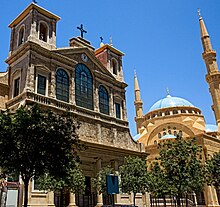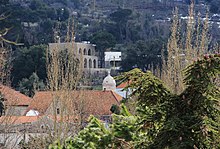
Back الدين في لبنان Arabic লেবাননে ধর্ম Bengali/Bangla Crefydd yn Libanus Welsh Θρησκεία στο Λίβανο Greek Religión en Líbano Spanish Religion au Liban French लेबनान में धर्म Hindi Agama di Lebanon ID Religioni in Libano Italian რელიგია ლიბანში Georgian


Lebanon is an eastern Mediterranean country that has the most religiously diverse society within the Middle East, comprising 18 recognized religious sects.[3][4] The religions are Islam (Sunni, Shia, and a small number of Alawites and Ismailis) and Christianity (the Maronite Church, the Greek Orthodox Church, the Melkite Greek Catholic Church, Protestantism, the Armenian Apostolic Church, the Armenian Catholic Church the Roman Catholic Church, the Syriac Catholic Church, the Syriac Orthodox Church, the Assyrian Church, the Chaldean Catholic Church and the Coptic Orthodox Church). The Druze comprise around 5% of Lebanon's population.[5]
Lebanese people, including the diaspora, are mostly Christians.[6][7] It is estimated that a large proportion of its population are refugees, accounting to approximately 2 million people out of a bit over 6 million in 2017, which affects statistics.[3] The refugees, who mostly are of Syrian or Palestinian origin, are predominantly Sunni Muslim, but include Christians and Shia Muslims.[3]
Lebanon differs from other Middle East countries where Muslims have become the majority after the civil war, and somewhat resembles Bosnia-Herzegovina and Albania, both are in Southeastern Europe, and have a diverse mix of Muslims and Christians that each make up a large proportion of the country's population. Christians were once a majority inside Lebanon and are still a majority in the diaspora, which consists of nearly 14 million people. The president of the country is traditionally a Maronite Christian, the prime minister a Sunni Muslim, and the speaker of parliament a Shia Muslim.[citation needed]
- ^ - 2022 Report on International Religious Freedom: Lebanon https://www.state.gov/reports/2022-report-on-international-religious-freedom/lebanon/ - 2022 Report on International Religious Freedom: Lebanon.
{{cite web}}: Check|url=value (help); Missing or empty|title=(help) - ^ Hobby (1985). Near East/South Asia Report. Foreign Broadcast Information Service. p. 53.
the Druzes and the Christians in the Shuf Mountains in the past lived in complete harmony..
- ^ a b c "International Religious Freedom Report for 2017". www.state.gov. United States Department of State. Retrieved 30 March 2019. Cites Statistics Lebanon for most Lebanon statistics
- ^ Alfred B. Prados (June 8, 2006). "CRS Issue Brief for Congress: Lebanon". The Library of Congress. Retrieved June 11, 2012.
- ^ Cite error: The named reference
ciawas invoked but never defined (see the help page). - ^ "Bassil promises to ease citizenship for expatriates". The Daily Star. 1 May 2014. Retrieved 17 April 2018.
- ^ Kechichian, Joseph A. (17 November 2015). "Lebanon contemplates a new citizenship law". gulfnews.com. Retrieved 17 April 2018.